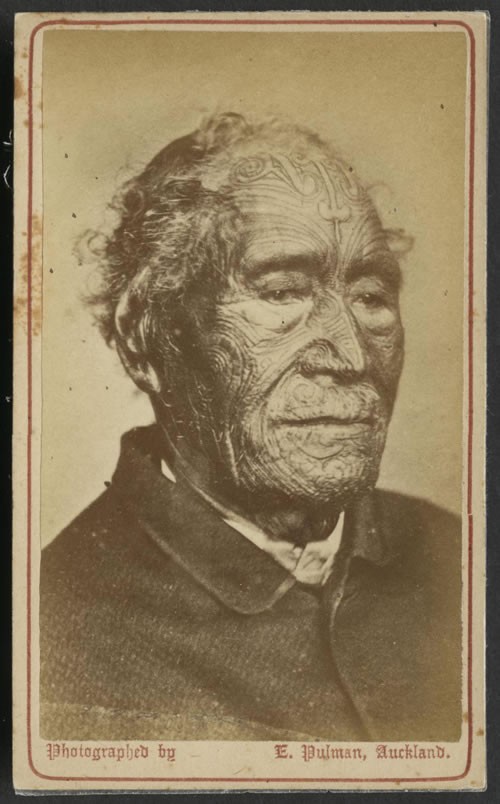
Photograph of the important and influential Ngāpuhi chief Tāmati Waka Nene, c. 1870. Many early New Zealand photographers made part of their income from selling portraits of Māori. Elizabeth Pulman, possibly our first woman photographer, was one of them. Taking over her husband’s two-year-old photography business after his death in 1871, Elizabeth built up the business by producing powerful portraits of Māori. This photo of the highly respected Ngāpuhi leader Tāmati Waka Nene, presumably taken shortly before his death in 1871, is one of many cartes de visite that Pulman produced. The value of the Pulman collection was such that it was bought by the government in 1900.
Waka Nene
Nene was a veteran of the Musket Wars of the 1820s. After the death of Hongi Hika in 1828 he took responsibility for protecting the Wesleyan mission at Hokianga. During the 1830s he adhered to the Wesleyan denomination although he was not baptised until 1839. He took the baptismal name of Thomas Walker (Tāmati Waka) after an English merchant who was a patron of the Church Missionary Society.
Nene had seen the advantages of a Pākehā presence and was anxious to maintain peace in the region to ensure good relations. As well as offering protection to the Anglican and Wesleyan missionaries he was supportive of the work of the British Resident, James Busby.
Nene spoke out strongly in favour of the Treaty of Waitangi during the debate on 5 February 1840. Discussions were at a delicate stage when he arrived. He argued that British intervention was necessary for peace and stability. Because lawless Pākehā were already in New Zealand the protection of the British was necessary. He maintained that it was impossible to turn back either Pākehā or time. Māori chiefs had largely lost control of the situation. While the governor should be a ‘father, judge and peacemaker’, Māori customs and lands should also be preserved. His speech was the turning point of the debate and influenced many of those present to sign the Treaty the following day. Nene was among the first to sign.
He was sympathetic to many of Hone Heke’s concerns during the build-up to the Northern War. He disagreed with Heke’s actions and after the sacking of Kororāreka fought against his Ngāpuhi kinsman.

Community contributions